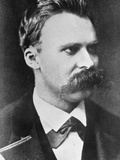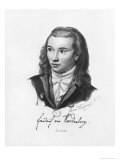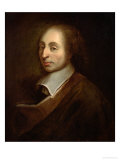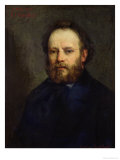|
|
|
|
|
Friedrich Nietzsche
b. 10-15-1844; Röcken bei Lützen, Prussia
d. 8-25-1900; Weimar, Saxony, German Empire
Friedrich Nietzsche, a 19th century philosopher, deeply questioned religion, morality, culture and science of an increasingly objectified and materialistic world, echoing American Ralph Waldo Emerson.
He was the youngest person to ever hold professorhip as the Chair of Classical Philology at the University of Basel.
While accused of being the inspiration for nazism, he actually broke with his anti-Semetic editor and found his sister and brother-in-laws efforts to establish a “Germanic” colony in Paraguay laughable. Regretably it was his estranged sister and mother who “edited” his writings and estate during his mental breakdown and death.
Carl Gustav Jung read Nietzsche as a student and “spoke informally to members of his inner circle about a thinker whose works had not only overwhelmed him with the depth of their understanding of human nature but also provided the philosophical sources of many of his own psychological and metapsychological ideas” between 1934-39.
Friedrich Nietzsche quotes ~
• “All sciences are now under the obligation to prepare the ground for the future task of the philosopher, which is to solve the problem of value, to determine the true hierarchy of values.”
• “And if you gaze for long into an abyss, the abyss gazes also into you.”
• “Art is the proper task of life.”
• “The essence of all beautiful art, all great art, is gratitude.”
• “He who laughs best today, will also laughs last.”
• “In large states public education will always be mediocre, for the same reason that in large kitchens the cooking is usually bad.”
• “Insanity in individuals is something rare - but in groups, parties, nations and epochs, it is the rule.”
• “There is always some madness in love. But there is also always some reason in madness.”
• “One must still have chaos in oneself to be able to give birth to a dancing star.”
• “That which does not kill us makes us stronger.”
• “What? You search? You would multiply yourself by ten, by a hundred? You seek followers? Seek zeros!.”
• “In architecture the pride of man, his triumph over gravitation, his will to power, assume a visible form. Architecture is a sort of oratory of power by means of forms.”
• “Remain faithful to the earth, my brothers, with the power of your virtue. Let your gift-giving love and your knowledge serve the meaning of the earth. Thus I beg and beseech you. Do not let them fly away from earthly things and beat with their wings against eternal walls. Alas, there has always been so much virtue that has flown away. Lead back to the earth the virtue that flew away, as I do—back to the body, back to life, that it may give the earth a meaning, a human meaning.”
• “There are many good inventions on earth, some useful, some pleasing: for their sake, the earth is to be loved. And there is such a variety of well-invented things that the earth is like the breasts of a woman: useful as well as pleasing.”
about Nietzsche ~
• “Nietzsche said without music, life would be a mistake. To me, without books, life would be a mistake.” ~ Ernest J. Gaines
• Nietzsche's Dancers : Isadora Duncan, Martha Graham, and the Revaluation of Christian Values
|
|
|
|
Novalis
b. 5-2-1772; Oberwiederstedt, Electorate of Saxony, Germany
d. 3-25-1801
Novalis was the pen name for Georg Philipp Friedrich Freiherr von Hardenberg, a philosopher, mystic and civil engineer closely associated with German Romanticism.
Novalis chose to write much of his work as ‘literary fragments’ - deliberate writings meant to be unfinished.
Novals quotes ~
• “Poetry heals the wounds inflicted by reason.”
• “A character is a completely fashioned will.”
• “I often feel, and ever more deeply I realize, that fate and character are the same conception.”
• “Learning is pleasurable but doing is the height of enjoyment.”
• “Only an artist can interpret the meaning of life.”
• “Philosophy is properly home-sickness; the wish to be everywhere at home.”
• “Where children are, there is the golden age.”
• The Birth of Novalis: Friedrich Von Hardenberg's Journal of 1797, With Selected Letters and Documents
|
|
|
|
William of Ockham
b. c.1288; Ockham, England
d. c.1348; Munich, Germany
Franciscan monk William of Ockham was one of the major figures of medieval thought and at the center of the major intellectual and political controversies of the fourteenth century. His feast day is April 10.
He is best remembered for Ockham's razor, a law of parsimony, economy or succinctness which recommends selecting from “competing hypotheses that which makes the fewest assumptions and thereby offers the simplest explanation of the effect”. Numquam ponenda est pluralitas sine necessitate [Plurality must never be posited without necessity],
|
|
|
|
Blaise Pascal
b. 6-19-1623; Clermont-Ferrand, France
d. 8-18-1662; Paris
Pascal, a child prodigy educated by his father, was a mathematician, physicist, and religious philosopher whose earliest work was in the natural and applied sciences.
Pascal made important contributions to the construction of mechanical calculators, study of fluids, clarified the concepts of pressure and vacuum by generalizing the work of Evangelista Torricelli, and corresponded with Fermat on the probability theory. Pascal wrote in defense of the scientific method, and after a mystical experience, abandoned his scientific studies.
Pascal quotes ~
• “Contradiction is not a sign of falsity, nor the lack of contradiction a sign of truth.”
• “The heart has its reasons which reason knows not.”
• “A trifle consoles us, for a trifle distresses us.”
• “All men's miseries derive from not being able to sit in a quiet room alone.”
• “All of our reasoning ends in surrender to feeling.”
• “Can anything be stupider than that a man has the right to kill me because he lives on the other side of a river and his ruler has a quarrel with mine, though I have not quarrelled with him?”
• “To ridicule philosophy is really to philosophize.”
• “Man's sensitivity to the little things and insensitivity to the greatest are the signs of a strange disorder.”
• “The last thing one discovers in composing a work is what to put first.”
• “Nature is an infinite sphere whose center is everywhere and whose circumference is nowhere.”
• “Joy, joy, joy, tears of joy.”
• Blaise Pascal death mask
|
|
|
|
Christine de Pizan
b. c.1362; Venice, Italy
d. c.1431
Christine de Pizan was a feminist philosopher and first professional women writer in the medieval era. Her first works as a writer was to provide for her family after the death of her husband. She then became a critic of Jean de Meun who slandered women in his Romance of the Rose.
The illustration for the presentation frontispiece of Christine de Pizan presenting her Collected Works to Queen Isabeau of France consists solely of females.
|
|
|
|
Plato
b. c. 427 BC; Athens, Greece
d. c. 347 BC
Plato, a Classical Greek philosopher, mathematician, writer of philosophical dialogues, founded the Academy in Athens, the first institution of higher learning in the Western world. He was a student of Socrates, and the teacher of Aristotle.
The term “platonic friendship” is primarily from Plato's work Symposium, which suggested that the most correct use of love was divine Eros, to direct one's mind to love of divinity.
Plato quotes ~
• “A hero is born among a hundred, a wise man is found among a thousand, but an accomplished one might not be found even among a hundred thousand men.”
• “Any man may easily do harm, but not every man can do good to another.”
• “Be kind, for everyone you meet is fighting a hard battle.”
• “Good people do not need laws to tell them to act responsibly, while bad people will find a way around the laws.”
• “He who is not a good servant will not be a good master.”
• “The highest form of pure thought is in mathematics.”
• “The madness of love is the greatest of heaven's blessings.”
• “Democracy, which is a charming form of government, full of variety and disorder, and dispensing a sort of equality to equals and unequals alike.”
• “Until philosophers are kings, or the kings and princes of this world have the spirit and power of philosophy, and political greatness and wisdom meet in one, and those commoner natures who pursue either to the exclusion of the other are compelled to stand aside, cities will never have rest from their evils — no, nor the human race, as I believe — and then only will this our State have a possibility of life and behold the light of day.”
• “Music is a more potent instrument for education than any other.”
• “Every heart sings a song, incomplete, until another heart whispers back. Those who wish to sing always find a song. At the touch of a lover, everyone becomes a poet.”
|
|
|
|
Pierre-Joseph Proudhon
b. 1-15-1809; Besançon, France
d. 1-19-1865
Pierre-Joseph Proudhon was mutualist philosopher and socialist who espoused a peaceful social revolution of workers' associations or co-operatives, and individual worker/peasant possession, over private ownership or the nationalization of land and workplaces.
Proudhon's thought influenced Makhail Bakunin.
|
|
|
|
Pythagoras
b. c. 569 BC; Samos Island, Greece
d. c. 475 BC; Metapontum, Magna Graecia, (Italy)
Philosopher Pythagoras was a mathematician and founder of the movement called Pythagoreanism.
Many discoveries were attributed to Pythagoras, including his famous theorem, as well as discoveries in the field of music, astronomy, and medicine.
Pythagoras quotes ~
• “There is geometry in the humming of the strings, there is music in the spacing of the spheres.”
• “Above all things, reverence yourself.”
• “Choose rather to be strong of soul than strong of body.”
• “The oldest, shortest words - “yes” and “no” - are those which require the most thought.”
• “There is a good principle which created order, light, and man, and an evil principle which created chaos, darkness, and woman.”
• Pythagorean Sourcebook and Library: An Anthology of Ancient Writings Which Relate fo Pythagoras and Pythagorean Philosopy
|
|
|
|
|
|
|
previous page | top | next
social studies > list notable philosophers > a | b | c | d | e | f | g | h | i-l | m | N-O-P | q-r | s | t-z < science
|
|
I have searched the web for visual, text, and manipulative curriculum support materials - teaching posters, art prints, maps, charts, calendars, books and educational toys featuring famous people, places and events - to help teachers optimize their valuable time and budget.
Browsing the subject areas at NetPosterWorks.com is a learning experience where educators can plan context rich environments while comparing prices, special discounts, framing options and shipping from educational resources.
Thank you for starting your search for inspirational, motivational, and educational posters and learning materials at NetPosterWorks.com. If you need help please contact us.
|
|
|















